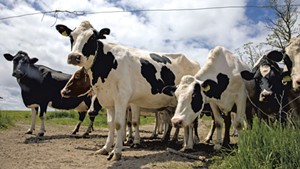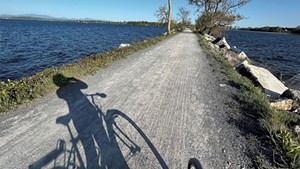Dairy Don'ts
[Re "'Get Big or Get Out,'" May 31]: Kirk Kardashian addressed the abuse of migrant workers and the pollution problems of industrial dairy production in Vermont but left out a central element in the equation — the animals from whose bodies the 300 million gallons of milk is extracted annually.
As Vermont dairy farms have increased in size, animal welfare has necessarily declined. The photo of the milking barn at Blue Spruce Farm says it all: hundreds of heifers on elevated metal platforms hooked up to automatic milking machines with zero opportunity to engage in any natural behaviors. Each one of those cows gave birth to a calf destined for life as a veal calf or an equally awful life as a heifer cow. A heifer's life on a dairy farm is a cycle of pregnancy, birthing and milking until her life ends at a slaughterhouse. Cows are sentient beings who experience grief and despair after the loss of their newborn calves. Cows are ruminants designed to graze for seven to 12 hours a day. Cows are social animals and bond with others in their herd. They are not machines.
Despite millions in taxes that Vermonters pay to clean up after Vermont dairy farms, the government shows no signs that it will support small organic dairy farms, like Canada does, and federal regulation/national market forces wouldn't allow the state to do so anyway.
The only real solution to the problem of giant dairy farms befouling the Green Mountain State is to stop promoting dairy farming as a Vermont brand.
Lucy Goodrum
Reading
Farmer Brown
[Re "How Now?": The Dairy Issue, May 31]: I find it interesting that in developed countries such as ours, the preferred use of the term "farmer" is to apply it to the landowner or individual with an ownership stake in the farm business. The people hired to help nurture and harvest the crops and do other agricultural work? Farmworkers or farmhands. Why is this? I prefer the older definition, where anyone laboring to grow plants or raise animals is a farmer, whether they happen to be fortunate enough to own the business or not.
Jill Andersen
St. George
Kudos and Criticism
Kudos on your dairy industry cover story ["'Get Big or Get Out,'" May 31]! We simply drive by every day without much thought as dairy farming in Vermont has gone from "more cows than people" in 1960 to the way of the buffalo.
Kudos on Anne Wallace Allen's report on the inspiring promotion of Dave Stever ["Former Ben & Jerry's Tour Guide Dave Stever Is Its New CEO," May 31]!
Kudos for the published letter by John McClaughry [Feedback: "Who Feels the Heat," May 31] and his spot-on comments on how S.5, aka the Affordable Heat Act, will only continue to bury the middle class here in Vermont! (A subsidy is a tax is a subsidy!)
Kudos on your legislative summary ["After Wrenching Debate Over Homelessness, Vermont Legislature Adjourns," May 13, online], which I hope highlights that Democrats must regulate and legislate us to death and, in doing so, continue to pass legislation when no one has any clue what it will cost!
But Seven Days put its head in the sand when deputy publisher Cathy Resmer suggested that the change of ownership at Twitter, to Elon Musk, could threaten the Tweet of the Week [From the Deputy Publisher: "RIP, Twitter?" April 26]!
No mention or effort to stand up to pre-Musk Twitter censorship of your likely politically estranged sister in print, the New York Post. The paper was not allowed to share key information in the brewing Hunter Biden scandal on the eve of the 2020 election.
News flash: I'm not an avid Donald Trump supporter!
Great diverse coverage again, overall, by Seven Days, but sometimes what is left out can be the bigger story!
Robert "Bob" Devost
Jericho
Road Worrier
[Re From the Publisher: "Shifting Gears," May 17]: Paula Routly has it exactly right — cycling can be terrifying in Vermont. And walking and cycling are getting less safe. Vermont is on track for its worst year ever. It breaks my heart that we are denying a whole generation the feeling of riding a bike or taking a simple walk.
How did we get here?
Clearly, changing a car-centered transportation paradigm is difficult. But you can't expect walking and cycling to be safe when streets and roads are designed to move cars.
Could the turn toward electric cars be part of the problem?
Somewhere in the 2000s, the state's policy makers, environmental groups and planning agencies started elevating the electric car as a solution and moved away from policies and programs aimed at reducing car use. This perpetuates a system that privileges the car above all else, cementing constituencies for roads, cheap parking and car-oriented urban design.
It also seems like our planning agencies have taken a turn toward cars. For example, the Chittenden County Regional Planning Commission — the most influential regional planning agency in the state — put a road at the center of its biggest transportation planning project: Envision89. Imagine if the $1 million it spent focused on planning that enabled people to safely drive less and walk and cycle more.
Change is hard, but it starts with a vision. And a vision for a system that is safe for walkers and cyclists of all ages seems a good place to start.
Richard Watts
Hinesburg
Zoning Isn't the Problem
Patricia Underwood Weaver's letter [Feedback: "Hypocrisy in Print," May 17] claims, as an aside to her main point, that zoning has contributed to Vermont's tight housing market. Kevin McCallum's "Test of Strength" [May 17] reports that some developers say zoning blocks the construction of affordable housing. While it is true that some developers say that, they do not support those statements with data.
Vermont has what is called a natural experiment: Most towns have zoning, and 27 towns do not have zoning. Individuals who claim that zoning is hindering affordable housing have only to look at the 27 towns without zoning. Some of those towns are within commuting distance of the larger cities and towns where the jobs are. None of the detractors of zoning has used any of those towns as examples that having no zoning unleashes the affordable housing market or any housing market.
Montpelier is many years ahead of the housing bill (S.100). Buildings with four units are permitted throughout the city. Yet Montpelier also has a tight housing market. I can only conclude that zoning is not a barrier to affordable housing and that doing away with zoning will not increase the construction of any housing, affordable or not.
Thomas Weiss
Montpelier









Comments
Comments are closed.
From 2014-2020, Seven Days allowed readers to comment on all stories posted on our website. While we've appreciated the suggestions and insights, right now Seven Days is prioritizing our core mission — producing high-quality, responsible local journalism — over moderating online debates between readers.
To criticize, correct or praise our reporting, please send us a letter to the editor or send us a tip. We’ll check it out and report the results.
Online comments may return when we have better tech tools for managing them. Thanks for reading.